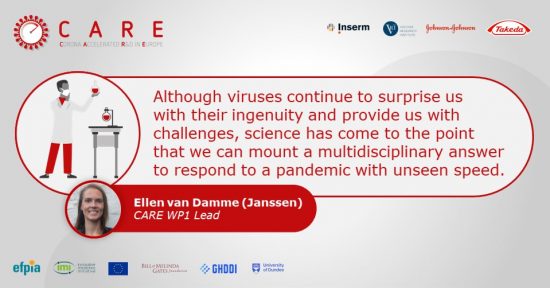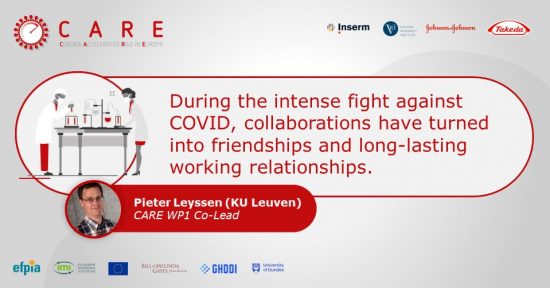December 13th 2021
The faces behind the CARE work-packages – WP1
The faces behind the CARE work-packages – WP1
CARE (Corona Accelerated R&D in Europe) is the largest European research initiative addressing the challenges of COVID-19. It is no surprise that it is designed in a comprehensive, yet agile, structure to fulfill the 37 partners’ shared key goals: (1) to identify therapeutics for the current pandemic, (2) to identify antiviral therapies for future outbreaks and (3) to increase the understanding of the pathophysiology of COVID-19. In a set-up of eight work-packages (WPs), the scientists and management at CARE carry out the project activities that have so far resulted in valuable learnings about the COVID-19 and how it might be defeated.
In this monthly series, we go behind the scenes through brief interviews with the leadership of each of the eight CARE work-packages to hear insights on what makes their work so special, as well as their challenges and hopes.


WP1 – Anti-coronavirus drug discovery in phenotypic virus-cell-based assays
The CARE work-package 1 (WP1) dedicates its efforts to identify small molecule therapeutic candidates against the current SARS-CoV-2 and potentially other variants of concern using the infectious virus. For this, the CARE scientists take a close look at how the virus can be inhibited in cell culture using drugs that could potentially qualify for repurposing, small molecule libraries and biologicals. The leads of WP1, Ellen van Damme (Janssen) and Pieter Leyssen (KU Leuven) share their view on the work in WP1 of the CARE project.
What makes the work at CARE special for you and your WP team?
Ellen: The CARE Consortium has enabled us to pull together experts from across Europe and bring the best minds together to mount an international answer to the challenges that the COVID-19 pandemic presents. By working together and rapidly exchanging information and knowledge, the whole is greater than the sum of its parts. Moreover, our collaboration has given rise to an armamentarium of assays already deployed to benefit consortium academic and industrial partners and beyond.
How has the collaboration within your team developed over the past year?
Pieter: During the intense fight against COVID, collaborations have turned into friendships and long-lasting working relationships, which is important to be prepared for future research challenges.
What has surprised you about working in the CARE project?
Ellen: Although viruses continue to surprise us with their ingenuity and provide us with challenges, science has come to the point that we can mount a multidisciplinary answer to respond to a pandemic with unseen speed. And yet, the virus keeps taking us by surprise, for example, with the emergence of new variants.
